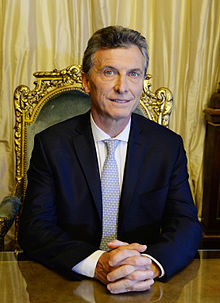

President of Argentina
8 February 1959 Tandil, Buenos Aires Province, Argentina
-
10 December 2015 – 10 December 2019
President of Argentina Mauricio MacriPresident of ArgentinaIn office 10 December 2015 – 10 December 2019Vice President Gabriela MichettiPreceded by Cristina Fernández de KirchnerSucceeded by Alberto FernándezPresident pro tempore of the Union of South American NationsIn office 17 April 2017 – 17 April 2018Preceded by Nicolás MaduroSucceeded by Evo Morales5th Chief of Government of Buenos AiresIn office 10 December 2007 – 10 December 2015DeputyGabriela Michetti María Eugenia VidalPreceded by Jorge TelermanSucceeded by Horacio Rodríguez LarretaNational DeputyIn office 10 December 2005 – 18 July 2007Succeeded by Julián ObiglioConstituencyCity of Buenos Aires Personal detailsBorn (1959-02-08 ) 8 February 1959 (age 62) Tandil, Buenos Aires Province, ArgentinaPolitical partyRepublican Proposal (PRO) (2008–present) Other political affiliationsCommitment to Change (2003–2008) Juntos por el Cambio (2015–present) Spouse(s)Yvonne Bordeu (1981–1991) Isabel Menditeguy (1994–2005) Juliana Awada (2010–present) Children4ParentsFranco Macri Alicia Blanco VillegasEducationPontifical Catholic University of Argentina Columbia UniversityProfessionCivil engineerSignatureWebsiteOfficial website Mauricio Macri (Spanish pronunciation: ; born 8 February 1959) is an Argentine businessman and politician who served as the President of Argentina from 2015 to 2019. He has been the leader of the Republican Proposal (PRO) party since its founding in 2005. He previously served as 5th Chief of Government of Buenos Aires from 2007 to 2015, and was a member of the Chamber of Deputies representing Buenos Aires from 2005 to 2007. Ideologically, he identifies himself as a liberal and conservative on the Argentine centre-right. Born in Tandil, Argentina, Macri trained as a civil engineer at the Pontifical Catholic University of Argentina and attended Columbia University for business school. After embarking on a business career, he was kidnapped in 1991 which, after being released, prompted him to enter politics. He served as president of football club Boca Juniors from 1994 to 2007, reestablishing its profitability which raised his public profile. In 2003 he launched the Commitment for Change, eventually developing it into the modern PRO party. Following an unsuccessful bid for Chief of Government of Buenos Aires in 2003, Macri was elected in 2007 and won re-election in 2011. Four years later he was elected president of Argentina in the 2015 general election – the first presidential runoff ballotage in Argentinian history. Macri became the first incumbent president to lose reelection to a second term during the 2019 general election. The presidency of Macri focused on reforming the national economy and improving diplomatic relations. He moved from a fixed exchange-rate system to a floating one, and removed taxes on exports and reduced subsidies on energy to reduce the fiscal deficit. He aligned the country with gradualist neoliberalism and re-opened Argentina to international markets by lifting currency controls, restructuring sovereign debt, and pressing free-market solutions. Domestically, he pursued moderate socially liberal policies, liberalized the energy sector, and combatted public corruption. Macri strongly opposed the government of Nicolás Maduro in Venezuela for human rights abuses and calls for a restoration of democracy in the country. He recognized Juan Guaidó, who was elected President of Venezuela by the National Assembly during the Venezuelan presidential crisis of 2019. Macri improved the relations with the United States and from Mercosur achieved a free trade agreement with the European Union and closer ties with the Pacific Alliance. During the first week in office, Macri annulled the Memorandum of understanding between Argentina and Iran, which would have established a joint investigation into the 1994 bombing with AMIA, a terrorist attack on a Jewish organization for which Argentina blamed Hezbollah and Iran. His legislative pursuits varied in efficacy and received mixed reception from Argentines and globally. His presidency has been criticized for failing to materially reform the economy while receiving praise for leaving a legacy of anti-corruption and increasing Argentina's sovereign marketability.

We use cookies
We use cookies and other tracking technologies to improve your browsing experience on our website, to show you personalized content and targeted ads, to analyze our website traffic, and to understand where our visitors are coming from. Privacy Policy.